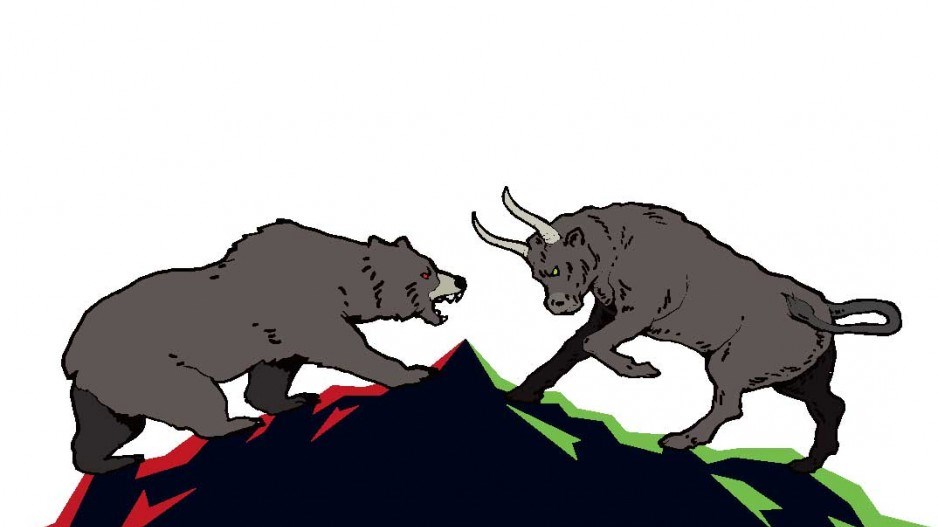Pierre Elliott Trudeau famously said that living next door to the U.S. was like sleeping with an elephant.
“No matter how friendly and even-tempered is the beast, if I can call it that, one is affected by every twitch and grunt,” he said.
That beast is no longer even-tempered and has been doing a lot of grunting and twitching under President Donald Trump.
But despite some of those grunts and twitches – softwood lumber duties, steel tariffs, North American Free Trade Agreement (NAFTA) negotiations conducted via Twitter – it hasn’t hurt the Canadian economy much because, ultimately, the American elephant has been growing, which is good for Canada, its largest trading partner.
The American economy has been growing for a solid decade, and American stock markets are now on their longest bull run ever.
Can a bear market and recession be far behind?
Nikita Perevalov, senior economist at Scotiabank Economics, says the bank’s modelling suggests that – barring any major unforeseen economic shocks – both the American and Canadian economies have another year of growth in them.
“Within the next four quarters, it’s still unlikely that we’ll see any recession coming,” he said.
The 2008-09 recession was so severe in the U.S. that the economy had a lot of ground to recover. So a decade-long recovery should not be cause for too much angst. The Organization for Economic Co-operation and Development projects the American economy will continue to grow at around 2.9% this year and 2.8% in 2019. Canada’s GDP growth is expected to be 2% this year and 2.2% in 2019, according to the Bank of Canada.
Business investment in Canada has lagged, compared with the U.S., and the Canadian stock market has not performed nearly as well as U.S. markets.
Uncertainty over tariffs and trade with the U.S. is suspected to have something to do with the reticence of businesses to invest in Canada. Any trade deal with the U.S. – whether a NAFTA renegotiation or something else – might therefore well unleash some pent-up investment here.
“Once the shape of the agreement is settled, potentially all those postponed decisions will come back,” Perevalov said.
Although market and economic contractions are inevitable, a correction or recession in the U.S. does not necessarily mean Canada would follow suit to the same degree.
Canada did suffer from a recession in 2008-09 as a result of the American financial crisis, but it was not nearly as severe as in the U.S. or in some European countries.
As the C.D. Howe Institute pointed out in a 2012 analysis on business cycles and recessions in Canada, the country’s economy has proven comparatively resilient over the last few decades. Recessions in Canada have been “exceptional events,” the analysis pointed out, although when they happen, they tend to be severe.
Over the past 35 years, Canada has experienced only three recessions, the C.D. Howe paper pointed out, and prior to the 2008-09 recession, the Canadian economy had been on “a 16-year uninterrupted expansion phase.”
Unlike the U.S., which has been on a non-stop growth trajectory for a decade now, a bit of air was already let out of the Canadian economy’s tires, thanks to the 2014-15 oil price crash.
The S&P/TSX composite index – which is heavily weighted with resource companies – fell 21% between April 10, 2015, and January 15, 2016, and Alberta suffered a regional recession in 2016, marked by a spike in unemployment and a 3.8% contraction in GDP growth.
As for the U.S. economy, some analysts believe it will not suffer a major contraction until 2020.
Although an economic downturn in the U.S. would have an impact on Canada, the biggest risk may be domestic. The Bank of Canada has warned that Canada’s economy is vulnerable to high real estate prices and high household debt.
And as McKinsey & Co. has pointed out, most of the economic downturns of the past few decades have been caused or aggravated by some form of credit crisis.
“Canada, which weathered the 2008 turmoil relatively well, has had a real estate bubble of its own in recent years,” McKinsey warned in an August briefing note. “Home prices have risen sharply in its major cities, and adjustable mortgages expose homebuyers to rising interest rates. Today, household debt as a share of GDP is higher in Canada than it was in the United States in 2007.”




